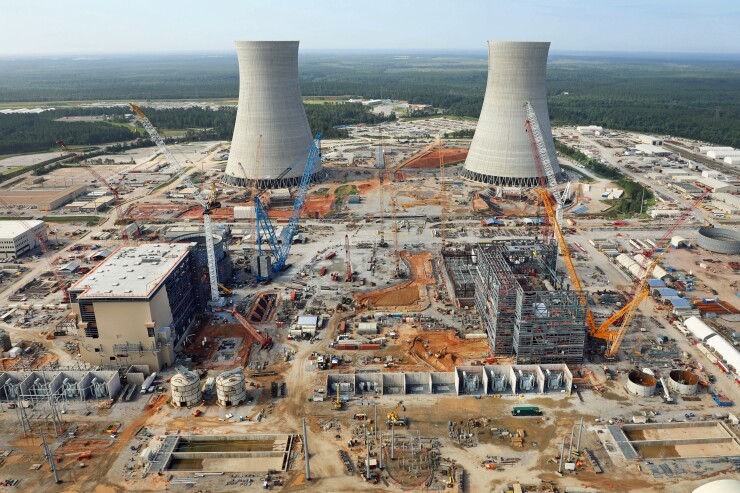Georgia Power Co. agreed to take more financial responsibility for building two reactors at Plant Vogtle to secure agreement from the project's public utility co-owners to continue construction -- for now.
In a joint statement late Wednesday, GPC, MEAG Power, Oglethorpe Power and Dalton Utilities said they a signed definitive agreement that will help mitigate the public utilities' future financial exposure to rising costs of the unfinished reactors.

The agreement followed a few tense days of negotiations to appease Oglethorpe, a Georgia cooperative, which sought a cap on future increases in order to vote for its continued participation in constructing the twin reactors.
“We are all pleased to have reached an agreement and to move forward with the construction of Vogtle Units 3 & 4 which is critical to Georgia’s energy future,” the owners’ statement said. “While there have been and will be challenges throughout this process, we remain committed to a constructive relationship with each other and are focused on reducing project risk and fulfilling our commitment to our member-consumers.”
A vote among the owners on whether to proceed with the project became necessary when investor-owned Georgia Power – which is heading up the project - said in August
Georgia Gov. Nathan Deal commended the owners.
“This project will ensure that Georgia citizens have a long-term, affordable and sustainable energy source, while also creating thousands of jobs,” Deal said. “I look forward to the completion of Plant Vogtle Units 3 & 4 and its continued impact on our economy and infrastructure.”
MEAG President Jim Fuller said his agency agreed to participate in the Vogtle project knowing there would be construction risk and because it “the best option if we wanted to reduce our carbon footprint and hedge against future carbon costs and increased natural gas prices.”
“MEAG Power had already taken several steps that will mitigate the impact of those increased costs, which is one reason our board voted unanimously to proceed with construction,” Fuller said. The “agreement includes significant additional safeguards that validate the wisdom of that vote.”
The public power owners have issued billions of dollars in tax-exempt bonds to fund their share of the project. Details of the complex new agreement were released in various market disclosures.
GPC, which owns 45.7% of the project, agreed to “take certain actions which partially mitigate potential financial exposure for the other Vogtle owners,” including the purchase of production tax credits from the other Vogtle owners, according to
GPC will also assume a larger portion of certain future cost increases that would ordinarily be paid by the three owners under their pro-rata ownership stakes if costs exceed amounts GPC reported in its 19th
GPC said its share of reactor costs would be $8.4 billion, up from $7.3 billion in 2017, plus $800 million of additional construction costs. GPC also said it would absorb most of its $1.1 billion share of the $2.3 billion increase in the estimated cost of completing the reactors, but didn’t rule out requesting a rate increase in the future.
That leaves an estimated $1.2 billion to be paid by the three public power agencies according to their ownership stakes: Oglethorpe owns 30%, MEAG 22.7%, and Dalton 1.6%.
The new agreement also says if the estimated cost to complete the reactors exceeds amounts in 19th construction report by more than $2.1 billion, the public power owners would have a one-time option to tender a portion of their ownership interest to Georgia Power.
At that point, GPC would have the option of canceling the project in lieu of buying ownership interests.
GPC also agreed to provide funding “under certain circumstances” for MEAG Power SPVJ, a subsidiary of MEAG that includes a 20-year take-or-pay power purchase agreement with JEA, a public utility in Jacksonville, Florida.
Georgia Power said it would purchase at discounted prices MEAG’s ownership of 206 megawatts linked to the Project J power purchase agreement if JEA continues litigating its obligations and that materially impedes MEAG’s access to the capital markets, or the PPA is voided by a court, or it is rejected by JEA in bankruptcy.
MEAG has issued $1.42 billion of Project J bonds for which JEA is obligated to pay debt service for 20 years. After that a group of MEAG’s members pay the remaining 20 years of the debt.
JEA said Wednesday that the Vogtle owners’ vote to proceed with the project “saddles ratepayers with the burden” of paying for the reactors.
“There is no guarantee that this amount will not continue to increase, so JEA will continue to act in finding a resolution that protects the interest of ratepayers in Georgia, Alabama and northeast Florida first,” the statement said.
In another development Wednesday, MEAG rejected an offer for replacement power submitted by JEA Sept. 18 as an alternative to continuing construction on the Vogtle project.
In that offer, JEA said it had secured term sheets for replacement power at an undisclosed facility that would pay debt service and save JEA, MEAG and Alabama-based PowerSouth Energy Cooperative more than $2.5 billion. PowerSouth has a separate 20-year PPA with MEAG, and supported moving forward with the project.
In rejecting JEA’s offer, MEAG said in a letter to JEA Wednesday that the offer understated costs and didn’t match the MEAG’s fiscal timeline. While JEA has a 20-year PPA, the debt issued by MEAG amortizes over 40 years.
MEAG also said that JEA’s offer failed to consider other aspects such as risks from future CO2 regulations and transportation costs, and the fact that MEAG still supports diversifying its generating resources.
On Wednesday, JEA Interim Managing Director Aaron Zahn asked MEAG for additional analysis to support its rejection of the power replacement offer.





